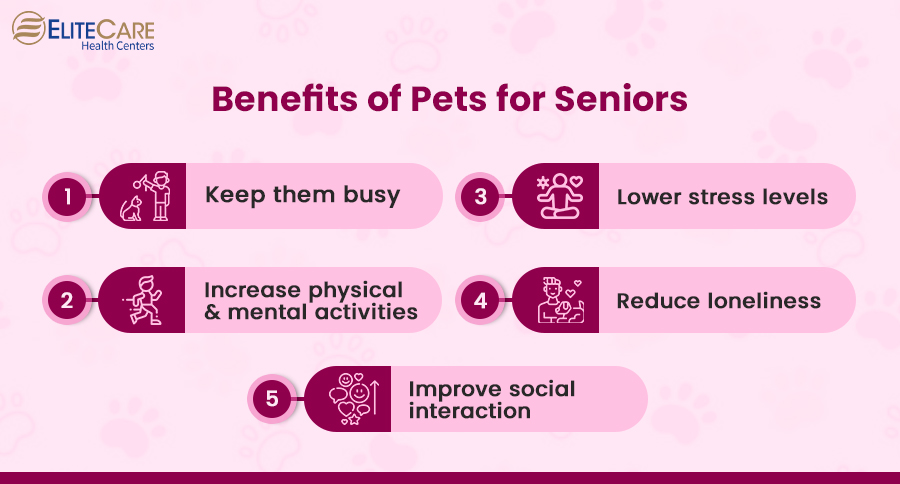
Pets can bring a lot of joy and companionship to our lives. Over the past decade, it has become more widely accepted that pet ownership and animal assistance in therapy and education may have many positive effects on humans. But before getting a pet, everyone should consider the responsibilities and potential challenges associated with pet ownership. For seniors, these considerations may be especially relevant, as aging can bring about changes in physical and cognitive abilities that can hinder pet care. Therefore, seniors must consider their responsibilities and physical abilities before getting a pet.
Let’s take a look at the potential benefits of having pets for seniors.
Benefits of Pets for Seniors

1. Keep them busy
Pets can keep seniors busy and engaged as they can provide a sense of purpose. Pet ownership can also give a sense of responsibility and a daily routine, which can be beneficial for maintaining their mental and physical health.
2. Increase physical and mental activities
Pets require a certain level of care, including regular exercise and playtime, which can encourage seniors to be more physically active. Studies have shown that pet owners are generally more active than non-pet owners. Increased physical activity can be beneficial for maintaining cardiovascular health, and it also helps reduce the risk of chronic disease.
In addition to physical activity, taking care of a pet can stimulate the mind and can be beneficial for cognitive health.
Read More: 5 Easy Gardening Activities for Seniors
3. Lower stress levels
Several studies have shown that as little as 15 minutes of interaction with an animal can enhance the production of hormones like serotonin, oxytocin, and prolactin which can help reduce stress levels.
A pet can be a meaningful companion for the elderly, providing them with a sense of purpose. Having a dog or cat can give them something to focus on, which can help to reduce stress levels and improve overall well-being.
4. Reduce loneliness
One of the most significant benefits of having pets is having a companion to spend time with. A pet can be extremely helpful in reducing loneliness, particularly for seniors who may be living alone or have limited social interactions. Pets can provide companionship, comfort, and support, which can help to alleviate feelings of isolation and loneliness.
5. Improve social interaction
Having a pet can also increase social interaction, as pet ownership can be a great conversation starter. Besides, seniors may be more likely to interact with other pet owners while taking their pets out for a walk. Seniors with pets are also more likely to have visitors and to be more involved in their communities, which can help combat social isolation.
It is also worth mentioning that not all senior citizens are the same, so what may be true for one may not be true for another. Therefore, it is a must for seniors to consider their own personal preferences and lifestyles when deciding if getting a pet is the right decision for them.
Factors to Consider Before Getting a Pet for Seniors

1. Physical abilities
Pet ownership requires a certain level of physical ability, including the ability to walk and take care of a pet’s needs. It includes feeding, grooming, and cleaning up after them. Therefore, it is crucial for seniors to consider their physical abilities and limitations when deciding whether to get a pet. If they have mobility issues or health conditions that limit their ability to care for a pet, it may not be the most suitable option for them.
2. Cognitive state
Being a pet owner also requires a certain level of cognitive ability, including remembering to feed the pet and administering medicine on time. Seniors should be in a stable cognitive state to recognize when something is wrong with their pets. If a senior is suffering from dementia or Alzheimer’s, it is not a wise idea to get them a pet.
Read More: Behavioural Changes in Older Adults with Alzheimer’s Disease
3. Living situation
When seniors are thinking of getting a pet, they should think about their living conditions and responsibilities. For instance, if they live alone, it can be difficult for them to take care of a pet by themselves. In contrast, if they have a support system such as caregivers or family members, it will be easier.
4. Lifestyle
If seniors travel frequently or have a busy schedule, it may not be the most sensible idea to bring a pet home. On the other hand, if they have a more relaxed lifestyle and have the time and energy to devote to a pet, it may be a sensible idea to bring a furry friend home.
5. Existing health conditions
Seniors with certain health conditions, such as allergies, asthma, or weakened immune systems may have trouble keeping a pet like a cat or a dog with hair. Check with a medical practitioner before getting a pet and ask if a pet would make any of their health problems worse.
6. Their love for animals
Not everyone likes to keep an animal or bird at home that requires extra attention. If a senior does not have a fondness for pets, it is wise not to get one. Pets require a lot of time and energy and if the senior is not an animal lover, the pet can get neglected, seniors can get stressed out, or both.
Conclusion
It is vital that seniors or their caregivers take all these factors into consideration when deciding whether to get a pet. In addition, they should be realistic about the level of commitment required for pet ownership. They can also consult with family members, friends, or healthcare professionals to get a better idea of pet ownership. Seek help from any senior care services and always double-check with your primary care physician about any health concerns that may be associated with owning a pet. For any queries or concerns about the health of your senior family members, contact EliteCare Health Centers and schedule an appointment with our board-certified geriatricians.






